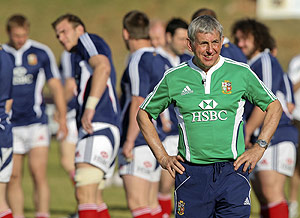
British and Irish Lions team coach Ian McGeechan attends a training session in Johannesburg, Tuesday, May 26, 2009. The Lions are in the country for a three-test tour. AP Photo
Ian McGeechan, the coach of the British and Irish Lions, has had a year preparing for Saturday’s Test against the Springboks at Durban. On the evidence of the the tour matches so far, all of which have been won by the Lions, he has done a good job in creating a side to take on the World Champion Springboks.
But whether this Lions can win the series, or even a Test must be doubtful.
Most of the tour matches, like the match against the Southern Kings on Wednesday, have been sternly contested by the local sides, which have played under the disadvantage of not having their Springbok players to add quality to the team.
The Lions absolutely monstered the Southern Kings scrum and won a (dubious) penalty scrum from one of the demolitions. But in most other areas of play, and this has been true of the other matches as well, the Lions were beaten at the breakdown, were more than held in the lineouts, and gave up break-outs by the Southern Kings that should have resulted in tries.
Without buying into the matter of non-neutral referees, it is fair to say that the Lions were helped with the interpretations of the breakdown laws, especially imposed by the Welsh referee, Nigel Owens.
Saturday’s Test will be refereed by the New Zealander Bryce Lawrence, the second Test at Pretoria by the Frenchman, Cristophe Berdos, and the third Test at Johannesburg by Stu Dickinson, Australia’s most experienced and best referee.
With the last two Tests being played at altitude, you’d have to think that a sea-level Test will be the best chance for the Lions to roar away to a victory.
There is the factor, too, that the Lions have had plenty of matches and practice to work out systems and combinations.
Most of the Springboks have not played a serious match in more than a month. We saw with the All Blacks last weekend that even a couple of weeks out of game time can soften up players for the inevitable physical contest that hard Tests expose, or should expose, players to.
I asked a friend with good South African contacts what the thinking in South Africa is about the opening Test and the series. He said that early on in the tour the call was for a 3 – 0 series victory for the Springboks.
But there is less certainty now.
The feeling is that if the Lions are to win a Test, the Durban Test is the one.
And the British media has come around to a similar conclusion. After writing the Lions off in the early part of the tour, we now have veterans like Nick Cain of the UK Sunday Times arguing that “the British and Irish Lions have nothing to fear from South Africa.”
Cain insists that the parallels between this Test and the 1997 series, won by the Lions 2 – 1, are “uncanny.”
The 1997 the Springboks had an inexperienced coach, as they have right now. The 1997 Springboks did not have a sharp-shooter goal-kicker like the Lions, and they do not have anyone now to match Stephen Jones and Ronan O’Gara.
There is a weakness in the present Springboks side at first five-eights, as there was in 1997.
Cain also insists that the Lions have “greater world class claims” than the Springboks in their outside backs.
The thing about history is that it repeats itself less often than historians or journalists.
The present Springboks have a Rugby World Cup trophy under their belts. The rump of the side comes from the Bulls, who played such magnificent rugby in the finals of the Super 14. They have a tremendous lineout. The scrum is adequate. The halfback Fourie du Preez is the best player in the world right now. Bryan Habana has got his flash back.
They are a formidable side and they will be playing in front of their home crowd, which will not allow the Lions supporters to out-enthuse them the way they did with the New Zealand and Australian supporters in 2005 and 2001.
In 2001, the Lions surprised the Wallabies by playing a brilliant ball-in-hand game to win the first Test. That side had many of the players who went on to win the Rugby World Cup for England in 2003.
In 2005, these players were past their best, and their inspirational leader Martin Johnson was retired. The build-up to the first Test of the series against the All Blacks was phenomenal.
On a rainy, icy night the All Blacks tore the Lions apart.
You would expect something similar to happen at Durban on Saturday.
And there is one other consideration that should favour South Africa. The match will be played at 3pm. It has been noticeable that the dry fields and the afternoon light has helped the South African sides to play their hard driving, kick-and-chase, and opportunistic intercept game far more effectively than they can do at night-time when the lights, the greasy ball and a slippery pitch makes the ball-in-hand game very difficult to play and the attritional Lions game easier to play.
So prediction time has come.
The proviso must be made that I was singularly unsuccessful with my predictions on the outcome of the 2007 Rugby World Cup.
However, here is my neck on the chopping block. The Springboks will win the series 3 – 0. They will be too big, too fast, have too muck skill, and will just be too good for the well-coached but essentially pedestrian 2009 British and Irish Lions.
Now, let the axe fall where it will.





























































































